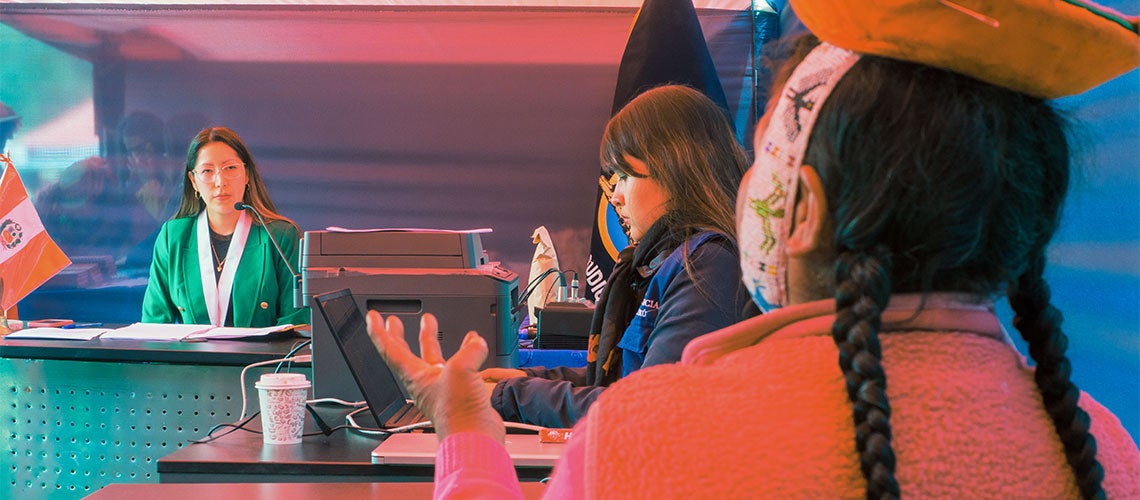 Mujeres de la comunidad de Patacancha, Cusco, conversan con personal del Ministerio de Justicia de Perú en las Ferias Itinerantes de Justicia. Foto: Lenin Quevedo / Banco Mundial.
Mujeres de la comunidad de Patacancha, Cusco, conversan con personal del Ministerio de Justicia de Perú en las Ferias Itinerantes de Justicia. Foto: Lenin Quevedo / Banco Mundial.
Andrea, like many others in Peru, endured the devastating impact of job loss in a nation heavily affected during the pandemic. Her situation worsened as she suffered violence at home, a crisis that intensified during lockdown. Back then, Andrea called Line 100 for help and was referred to Temporary Shelter Homes (Hogares de Refugio Temporal or HRT) where she and her children were housed and received proper care.
Like Andrea, in 2021, this service provided 2350 people with assistance through the 22 HRT in Peru. Additionally, 8196 survivors received psychological assistance as part of this service, contributing to their emotional recovery.
In Latin America and the Caribbean (LAC), the percentage of women who reported that their partners physically and sexually abused them at some point in their lives, ranges from 16 percent in Panama to more than 42 percent in Bolivia. Andrea's story is a representative case in the region, and her experience highlights the need for comprehensive strategies to tackle Gender-Based Violence (GBV). Despite recent efforts for legal updates to address GBV and the critical issue of femicide in LAC, there are still high levels of social justification, normalization, and acceptance of violence .
In Peru, for instance, a striking 59 percent of the population show social tolerance towards violence against women , as reported by the latest National Survey on Social Relations (Encuesta Nacional sobre Relaciones Sociales or ENARES). This produces immediate and long-term harm to survivors and their families, while imposing considerable economic costs on society.
Addressing these challenges requires not just legal reform but also a shift in social attitudes, norms, and behaviors. Thus, effective measures include multi-sectoral approaches that involve both men and women, focus on a collective effort, include young populations, etc. This can involve a combination of cash transfers with economic empowerment for women, discussions on GBV, gender transformative programming, couples’ interventions, parenting programs, community activism, and school-based initiatives.
Harnessing data in Peru
The effects of the pandemic on GBV are still resonating today, as highlighted by a recent study that found that households that were most likely to lose a job during COVID-19 experienced increases in GBV. Peru was hit particularly hard by the pandemic and experienced a 48 percent increase in the incidence rate of calls to their domestic violence hotline
In response, Peru has implemented a range of initiatives that serve as valuable case studies from which to learn . Key among these efforts is the enhancement of Peru’s Centralized Emergency Response System, which has improved its emergency hotline capabilities through geo-location services, advanced software and equipment, and comprehensive training on GBV emergency management and protocol development for hotline operators and first responders. Additionally, Peru is gathering and analyzing data on the effectiveness of its policies, setting a regional benchmark for using data-driven approaches to develop interventions and measure their success.
Working together against gender-based violence
Currently, the World Bank is actively involved in supporting the GBV prevention and response agenda in Peru, in collaboration with the Ministry of Women and Vulnerable Populations (MIMP). For instance:
- A mobile app, Yanapp, informs survivors to prevent GBV, especially in emergency situations through community efforts.
- A course on preventing sexual harassment at universities<.
- A communication strategy for adolescents that includes age-appropriate material such as comics.
- Support for the implementation of the ALEGRA centers, which provide legal assistance through the Justice Services Improvement Project.
The MIMP has also teamed up with researchers from the World Bank’s LAC Gender Innovation Lab, academia, and the non-profit Innovations for Poverty Action, to evaluate the intervention Leaders in Action (ICLLOS for its name in Spanish). ICLLOS trains leaders of local organizations to conduct training and awareness campaigns following a specific curriculum aimed at changing social norms around violence.
This intervention is set out to test the Community Health Volunteer framework, to see if it can be adapted to work on GBV prevention. The experiment tests different innovative approaches to deliver the program; for example, the intervention studies how to involve community leaders in door-to-door awareness campaigns and the potential for edutainment to complement traditional efforts. The knowledge generated by this evaluation can inform the scale-up of cost-effective components to the region.
The diverse and impactful strategies implemented in Peru demonstrate a progressive approach to addressing GBV . Key to this approach is promoting economic autonomy and quality job opportunities for women, which is a challenge that is part of a wider gender strategy. These measures, supported by the World Bank and other partners, signify a hopeful shift towards reducing GBV in LAC.
Such efforts not only provide immediate support to survivors like Andrea, but also pave the way for a future where stories of prevention, resilience and recovery become more common, moving towards a society free of gender-based violence.
The LACGIL within the Poverty and Equity Global Practice, works in partnership with units across the World Bank, aid agencies and donors, governments, non-governmental organizations, private sector firms, and academic researchers. This work has been funded in part by the World Bank Group's Umbrella Facility for Gender Equality (UFGE), a multi-donor trust fund administered by the World Bank to advance gender equality and women's empowerment through experimentation and knowledge creation to help governments and the private sector focus policy and programs on scalable solutions with sustainable outcomes. The UFGE is supported by generous contributions from Australia, Canada, Denmark, Finland, Germany, Iceland, Ireland, Latvia, the Netherlands, Norway, Spain, Sweden, Switzerland, United Kingdom, United States, the Bill and Melinda Gates Foundation, and the Wellspring Philanthropic Fund.
Subscribe and receive a weekly article
Related articles:





Join the Conversation